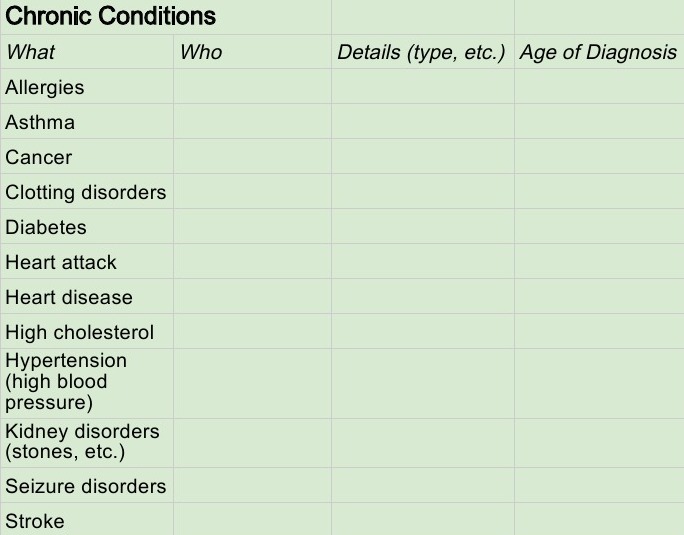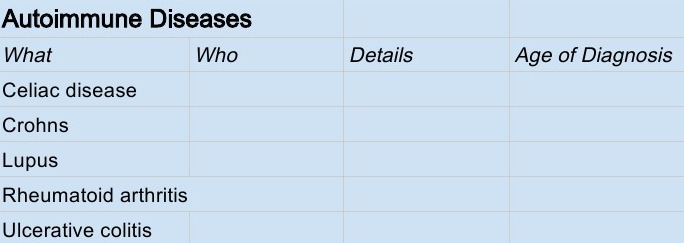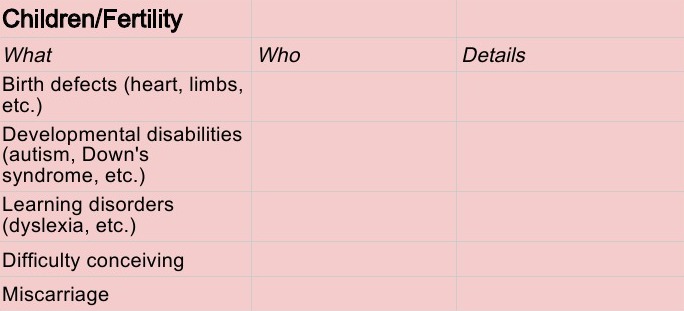You exercise regularly (or whenever you can). You watch what you eat. But there’s another piece of the puzzle you may be forgetting: family history. Genetics can be a big component of your overall picture of health, so it’s important to know what ails old Aunt Myrtle and that cousin on your mom’s side you don’t know very well.
I became more interested in my family health tree recently when I established myself with a new doctor. In addition to a physical he collected health information about relatives as part of my history. Before the appointment I was so preoccupied with fasting for my blood panel and thinking about my own health history that I completely forgot about my family. I felt a little stupid as he began the family questions and I struggled to answer them. Most of it was information I knew, but I hadn’t thought about it in a while; the information was in a dark and dusty corner of my brain.
It was then that I decided I was once and for all going to write down my family health tree for future reference. It seemed like the responsible, adult thing to do at least. Gone are the days when a parent went to the doctor with me and could tell her everything she needed to know. Now it’s up to me. If your memory is like a steel trap, well, good for you. Many of us need to write things down to keep them from getting lost in that dark corner I mentioned. Thus my spreadsheet of family health history in color coded style was born!
Thanksgiving?
So where’s the Thanksgiving connection? Hopefully you’ll be surrounded by family this Thursday, maybe even some you don’t see often. A family gathering like this is a perfect time to begin conversations about relatives’ health. These don’t have to be sad conversations, and you likely won’t be the only person interested in the topic. Everyone can benefit from being more informed about the family’s genes. Armed with this knowledge, family members can make smart and informed decisions about their lifestyles and healthy habits.
You can start by asking about certain relatives of interest to you, or you can move categorically the way you’d organize the information for record keeping. For example, ask about chronic conditions, autoimmune diseases, and mental health conditions in the family. Females may also want to ask about fertility problems relatives have had or children born with certain conditions.
Organizing the Info
As you’re learning about what conditions or diseases exist in your family, there are some pieces of information that are particularly important to discover how the ailments could relate to you or your children.
What is the condition?
Who has it? Is that person on your paternal or maternal side? If it’s a cousin, note male or female.
What are the pertinent details? If it’s diabetes, what type is it?
How old was the person when he or she was diagnosed?
Does anyone in the family have recurring infections? If so, get all the details you can.
Are there patterns of conditions in the family? For example, does anything skip generations?
It’s also good to know your ethnicity. It’s fun to know where your various ancestors came from, but ethnicity can actually help determine risk level because some groups of people are more prone to specific diseases.
Finally, talk to the oldest members of the family since they have the greatest years of knowledge to draw on. Do they remember any young or sudden deaths in the family? If so, who and what was the cause? If your family member has difficulty remembering or describing what health problems she has, ask what medications she takes. These can be a stepping stone to determining what’s going on with her health. The same goes for surgeries; an older person may not remember a diagnosis, but may remember having a surgery in the past.
If this year is more of a Friendsgiving and you won’t be around blood relatives, you can still collect your family health history in steps. Gather your questions and call a parent, grandparent, or other older family member. At the end of the conversation ask them who else you should talk to for more information. Offer to share the information you collect with other family members when you’ve finished. Better yet, if your relatives are tech savvy, create a spreadsheet that can be shared for group editing to collect information faster.
If you’d like to dive a little deeper into collecting a comprehensive health history for your family, the National Institutes of Health has more detailed information, including a tool for collecting your information online and in print. This may be great for some people, but I prefer my Google spreadsheet that I can easily and quickly update or reference anytime. No matter what you choose, I encourage you to start these important conversations this holiday season with your loved ones.
Do you know your family’s health history? Have you collected information a different way? Has there been a time in your life when a family member’s medical history was important for you?
Photo courtesy of Jason Howle.
Disclaimer: I am not a medical professional. This is not an exhaustive list of family health history to give your doctor. This list is meant to generate conversations and offer a way to organize your information.












